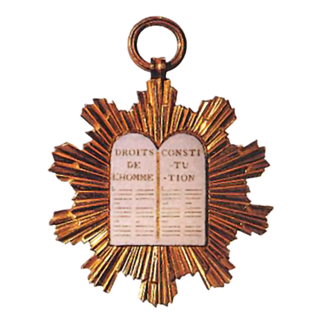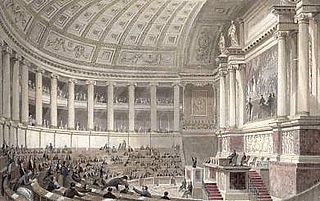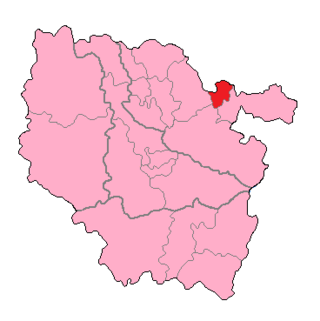
The president of France,officially the president of the French Republic,is the executive head of state of France,and the commander-in-chief of the French Armed Forces. As the presidency is the supreme magistracy of the country,the position is the highest office in France. The powers,functions and duties of prior presidential offices,in addition to their relation with the prime minister and government of France,have over time differed with the various constitutional documents since the Second Republic.

The prime minister of France,officially the prime minister of the French Republic,is the head of government of the French Republic and the leader of the Council of Ministers.

The National Assembly is the lower house of the bicameral French Parliament under the Fifth Republic,the upper house being the Senate. The National Assembly's legislators are known as députés,meaning "delegate" or "envoy" in English;etymologically,it is a cognate of the English word deputy,the standard term for legislators in many parliamentary systems.

The Senate is the upper house of the French Parliament,with the lower house being the National Assembly,the two houses constituting the legislature of France. The French Senate is made up of 348 senators elected by part of the country's local councillors,as well as by representatives of French citizens living abroad. Senators have six-year terms,with half of the seats up for election every three years.

The Legislative Assembly was the legislature of the Kingdom of France from 1 October 1791 to 20 September 1792 during the years of the French Revolution. It provided the focus of political debate and revolutionary law-making between the periods of the National Constituent Assembly and of the National Convention. Legislative Assembly saw an unprecedented turnover of four ministers of Justice,four ministers of Navy,six ministers of the interior,seven ministers of foreign affairs,and eight ministers of war.

France is a unitary semi-presidential republic with a bicameral legislature. Public officials in the legislative and executive branches are either elected by the citizens or appointed by elected officials. Referenda may also be called to consult the French citizenry directly on a particular question,especially one which concerns amendment to the Constitution.

The French Parliament is the bicameral legislature of the French Fifth Republic,consisting of the upper house,the Senate,and the lower house,the National Assembly. Each assembly conducts legislative sessions at separate locations in Paris:the Senate meets in the Palais du Luxembourg,the National Assembly convenes at the Palais Bourbon,both on the Rive Gauche.

The Government of France,officially the Government of the French Republic,exercises executive power in France. It is composed of the prime minister,who is the head of government,as well as both senior and junior ministers.

The National Assembly is the unicameral legislature of Senegal. The Assembly was previously part of a bicameral legislature from 1999 to 2001 and from 2007 to 2012,with the indirectly elected Senate being the upper house. The Senate was abolished for a second time in September 2012.

Chamber of Deputies was a parliamentary body in France in the nineteenth and twentieth centuries:
Alain Marc is a member of the French Senate,who represents the department of Aveyron.

Jacques Grosperrin is French politician of The Republicans who has been a member of the Senate since the 2014 elections,representing the Doubs department. Previously he served as a member of the National Assembly of France from 2007 until 2012.

Stéphane Demilly is a French politician of the Union of Democrats and Independents (UDI) who served as a member of the National Assembly of France from 2002 until 2020,representing the Somme department.

François Calvet is a French politician,a member of the National Assembly. He represents the Pyrénées-Orientales department,and is a member of the Union for a Popular Movement. On 25 September 2011 he was elected senator of the Pyrénées-Orientales and therefore leaves the National Assembly. His deputy is Jean-Pierre Romero,mayor of Port-Vendres. He is a member of the Study Group on the question of Tibet of National Assembly.

The politics of France take place with the framework of a semi-presidential system determined by the French Constitution of the French Fifth Republic. The nation declares itself to be an "indivisible,secular,democratic,and social Republic". The constitution provides for a separation of powers and proclaims France's "attachment to the Rights of Man and the principles of National Sovereignty as defined by the Declaration of 1789".

The 6th constituency of Moselle is one of the nine legislative constituencies in the Moselle département (Lorraine).

The 4th constituency of Seine-Saint-Denis is a French legislative constituency in the Seine-Saint-Denis département.

Yaël Braun-Pivet is a French lawyer and politician who was President of the French National Assembly from 28 June 2022 to 9 June 2024. She is the first woman to have held this position. A member of Renaissance (RE),she was previously Minister of Overseas Territories under Prime Minister Élisabeth Borne from May to June in 2022. She has been a member of the French National Assembly since 2017,representing the department of Yvelines.

Paris's 19th constituency was one of the 21 French National Assembly constituencies in the Paris department in the period 1988 to 2012. It was abolished in the 2010 redistricting of French legislative constituencies,which reduced the number of constituencies in Paris to 18. The territory of the 19th constituency,in the north of Paris,corresponds almost exactly with the post-2012 17th constituency.

Paris's 20th constituency was one of the 21 French National Assembly constituencies in the Paris department in the period 1988 to 2012. The constituency covered three districts of the 19th arrondissement:Pont-de-Flandres,Amérique and Combat.

















